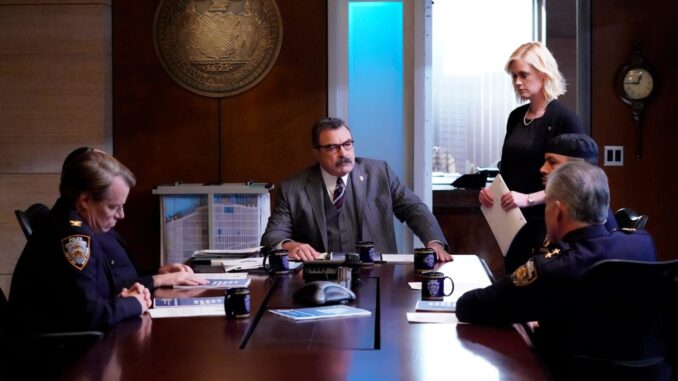
“Reflecting on the Legacy of Blue Bloods: Cast and Creators Bid Farewell to CBS’s Long-Running Police Drama”
As the beloved CBS series Blue Bloods begins its final season, fans and the cast alike are taking a bittersweet look back at the show that brought family values, justice, and tradition into viewers’ homes for over a decade. The police procedural, which follows the lives of the Reagan family, a family deeply dedicated to law enforcement and justice, launched its first of eight final episodes this past Friday night. The series, known not only for its gripping storylines but for its depiction of family bonds, is wrapping up a remarkable 14-season run. In a recent event honoring the show, cast members Tom Selleck, Donnie Wahlberg, Bridget Moynahan, Vanessa Ray, Len Cariou, Marisa Ramirez, and executive producer Kevin Wade gathered to share stories, reflect on the show’s impact, and celebrate the legacy they built together.
A Remarkable Run and Unanticipated Ending

For Blue Bloods, the journey has been nothing short of incredible. Originally slated for just 10 episodes in its final season, the show’s high ranking as the sixth most-watched broadcast show in the U.S. led CBS to expand its final run by an additional eight episodes. “We were only supposed to do 10 shows for the 14th season, and it kind of helped that we were the No. 6 show out of 100 broadcast shows,” Selleck told the crowd at the commemorative event. “These eight shows that we can look forward to are because CBS agreed and wanted to do that and celebrate, and not only celebrate but commemorate.”
Selleck, who played the family patriarch and NYPD Commissioner Frank Reagan, admitted he was disheartened by the news of the show’s cancellation. Both he and the production team fought to keep the show alive, but ultimately CBS decided it was time to bring the Reagan family’s story to an end.
A Legacy of “Appointment Television”
As Blue Bloods bids farewell, it’s important to note the show’s unique accomplishment: being one of the few remaining “appointment TV” shows. In a world where streaming platforms have reshaped the way audiences consume media, Blue Bloods maintained a dedicated viewership that tuned in week after week, specifically for its Friday night time slot. Selleck reflected on this achievement with pride, stating, “I have great faith and have had great faith in broadcast television. I think it’s suffered from being put in second or third place… but we became appointment TV.”
The Friday 10 p.m. slot is notoriously challenging, yet Blue Bloods consistently won its time slot for the better part of its run. Selleck humorously noted how the development of recording technology changed viewer habits, joking, “We became an appointment and then the ability to record shows developed, so it was, ‘I’m tired, so I’ll see it in the morning.’ That’s rare. And, as much as anything, it’s a reflection of the work we do.”
A Bond Between Cast and Audience
For those who followed Blue Bloods over the years, watching the Reagans’ weekly family dinners became a special ritual. These scenes of the family gathered around the dinner table allowed viewers to feel a unique sense of connection, often making them feel like a part of the Reagan family. Selleck touched on this aspect of the show, remarking that it created a relationship where the audience knew more than the characters themselves. “By the time we sit down to family dinner, they [the audience] know an awful lot of secrets that maybe everyone at that table does not know,” he explained. “And that’s the sense of discovery, they know more than the people at the table. ‘Hey, wait till he hears that’.”
This connection with the audience was reinforced through realistic, grounded storytelling. The series avoided clichés and treated viewers with a level of respect rarely found in long-running dramas. By addressing clichés directly, the show broke down narrative walls, making viewers feel that their understanding of the Reagan family went beyond the surface.
The Cast’s Enduring Commitment
Each cast member of Blue Bloods brought something unique to the series, contributing to its sense of authenticity and depth. Donnie Wahlberg’s portrayal of Detective Danny Reagan, the passionate, sometimes impulsive, but always honorable brother, brought an edge and energy that balanced the more reserved characters. Meanwhile, Bridget Moynahan’s Erin Reagan-Boyle, a district attorney who often found herself in morally complex situations, offered a different perspective on justice and duty. Vanessa Ray’s Eddie Janko added a fresh, evolving storyline as she married into the Reagan family, offering insight into the personal sacrifices required in their line of work.

Len Cariou, who portrayed the Reagan family’s grandfather, Henry Reagan, became a symbol of tradition and continuity, representing the older generation’s values and serving as a grounding influence on the family. Marisa Ramirez’s character, Maria Baez, added warmth and camaraderie to the show, particularly in her partnership with Danny. Together, the cast became a family off-screen as well, with each actor expressing appreciation for their shared journey.
An Unmatched Legacy of Family, Faith, and Justice
While the end of Blue Bloods is bittersweet, the legacy it leaves behind is powerful. Since the very beginning, the show has focused on the theme of family unity, showing how deeply committed the Reagans were to each other and to the values they held dear. The series exemplified what it meant to uphold duty, justice, and faith in an era of increasing divisiveness. Its commitment to showing multiple perspectives on challenging issues allowed audiences to see the gray areas of life, making it more than just a police procedural. Blue Bloods gave viewers a chance to explore what family truly means in a world of complexities and conflicts.
The series also tackled important social issues, reflecting changes in both law enforcement and society over the years. From grappling with systemic challenges in the justice system to exploring family dynamics in times of personal and professional crisis, Blue Bloods resonated because it didn’t shy away from the tough conversations. By offering a glimpse into the personal lives of its characters, the show allowed viewers to see beyond the badge, fostering empathy and understanding for those in law enforcement.
A Bittersweet Farewell
As the final season unfolds, fans are preparing to say goodbye to the Reagan family. Donnie Wahlberg hinted at an emotional conclusion, sharing that there would be “a very sad scene” in the series finale, and added, “There’ll be a lot of tears.” The cast and crew of Blue Bloods have crafted a series that will undoubtedly be remembered as one of television’s enduring classics, and for fans, saying goodbye is indeed bittersweet. However, the impact the show has had on both its viewers and its genre is undeniable, leaving a legacy that will endure even as the Reagans close this chapter.
In an era where family values, justice, and personal sacrifice can feel increasingly rare, Blue Bloods offered a reminder of the importance of standing together. The show brought audiences into the Reagan family’s world, and for 14 seasons, it became a family tradition for many viewers. While all good things must come to an end, the legacy of Blue Bloods will continue, cherished by those who tuned in for the stories, the values, and, most importantly, the family at its heart.
